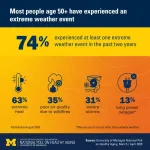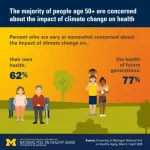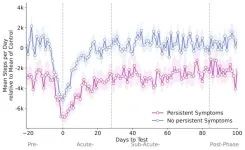(Press-News.org) Nearly 3 out of every 4 older Americans have experienced at least one extreme weather event in the last two years, a new University of Michigan poll finds. And living through such an event appears to make a big difference in how they view the potential impact of climate change on their health.
The new findings from the National Poll on Healthy Aging show that 59% of people aged 50 and over are concerned about how climate change could affect their health.
The percentage expressing concern was even higher among those who had recently lived through a weather emergency such as a wildfire, extreme heat, severe storm or power outage lasting more than a day. In all, 70% of those who had experienced at least one such event in the past two years expressed concern about climate change and their health, compared with 26% of those who had not lived through such an event.
Other groups of older adults were also more likely to say they are concerned about the effects of climate change on their health, including women, those reporting fair or poor mental health, and those who live in urban areas.
Only 6% of people over 50, though, had talked with a health care provider about how extreme weather might affect their health and how they could prepare or protect themselves.
This finding suggests more opportunity for older adults to ask their doctors and other health care providers about things like how to protect their lungs from wildfire smoke, how to prepare for prolonged disruptions to their supply of medications or the electricity that powers their medical equipment, or how to know where to find cooling centers, warming centers and emergency shelters in their community.
“Our findings suggest a need to help more older adults understand and take steps to prepare for the impacts of wildfires, hurricanes, tornadoes, extreme heat waves, winter storms and more, especially when it comes to the medications, medical supplies, electricity and access to care that these emergencies can disrupt,” says Sue Anne Bell, Ph.D., FNP-BC, a nurse practitioner and associate professor at the U-M School of Nursing who worked with the poll team. Bell specializes in studying the impacts of disasters and public health emergencies among older adults.
The poll is based at the U-M Institute for Healthcare Policy and Innovation, and supported by Michigan Medicine, U-M’s academic medical center.
In addition to the national poll report, the team compiled data for Michigan adults aged 50 and older compared with those in other states; an interactive data visualization is available at https://michmed.org/MDKQ2. An article summarizing the Michigan findings is available at https://michmed.org/28dbD.
The poll was conducted in August 2024, before some of the most extreme climate-related emergencies of the past year, such as September’s Hurricane Helene – the deadliest hurricane to strike the U.S. since Hurricane Katrina in 2005 – and the wildfires in the Los Angeles area in January of 2025.
In all, 2023 and 2024 were nearly tied for the number of weather and climate disasters with costs of more than a billion dollars, and the number of disasters of such magnitude has grown over the lifetimes of today’s older adults.
In addition to concern for their own health, 74% of people aged 50 and over say they are concerned about the potential impact of climate change on the health of future generations. That includes 43% who say they are very concerned, and 31% who are somewhat concerned.
Those older adults who had lived through a weather emergency in the past two years were more likely to express concern about future generations, with 83% of them saying they’re concerned, compared with 45% of those who had not experienced a weather emergency.
Extreme heat was the most common extreme weather event experienced by poll respondents, with 63% saying they had experienced at least one major heat wave in the past two years. Poor air quality due to wildfire smoke was next most common, at 35%, and 31% had been in the path of a severe storm. Prolonged power outages (lasting more than one day) were next most common, at 13%; power outages may be due to factors other than extreme weather.
The poll also asked older adults which potential future effects of climate change concerned them most. The most-cited potential future effect was more extreme heat events (70%), followed closely by air pollution and poor air quality (69%), loss of basic infrastructure like power and water (68%), more frequent severe storms (68%), and changes in infectious diseases (66%).
“These kinds of events can affect an older adult’s health directly – for instance, people with asthma and other lung diseases can have trouble breathing due to wildfire smoke, home medical equipment can be affected by power outages, and older adults can be more vulnerable to extreme heat and cold,” says poll director Jeffrey Kullgren, M.D., M.P.H., M.S., a primary care physician at the VA Ann Arbor Healthcare System and associate professor of internal medicine at U-M.
“But there are also indirect effects, including mental stress, lack of access to medications and medical care, and in extreme cases, lack of ability to evacuate safely or find shelter,” he added.
Bell notes, “Planning and preparing for emergencies is especially important for those with complex health conditions and disabilities, who should ask their regular health care provider for advice as well as seek information from their local and state emergency preparedness authorities.”
Poll respondents reporting a health problem or disability that limits their daily activities were slightly more likely than other older adults to say they had spoken with a health care provider about how to prepare for a climate-related emergency, at 8% vs. 5%. Among all older adults who had had such discussions, 64% had taken at least one action to prepare.
The U.S. government’s Ready.gov website offers information about how to prepare for and cope with extreme weather events and other emergencies.
Bell previously worked with the poll team to explore what older adults have done to prepare for emergencies; read the report here.
The poll findings come from a nationally representative survey conducted by NORC at the University of Chicago for IHPI and administered online and via phone in August 2024 among 3,486 adults ages 50 to 94 across the U.S. The sample was subsequently weighted to reflect the U.S. population. Read past National Poll on Healthy Aging reports and about the poll methodology.
END
Weather emergencies affect older adults’ views on climate and health
People over 50 who recently experienced an extreme weather event are far more likely to express concern about the effects of climate change on their health
2025-03-20
ELSE PRESS RELEASES FROM THIS DATE:
Graz University of Technology team decodes heat conduction of complex materials
2025-03-20
Complex materials such as organic semiconductors or the microporous metal-organic frameworks known as MOFs are already being used for numerous applications such as OLED displays, solar cells, gas storage and water extraction. Nevertheless, they still harbour a few secrets. One of these has so far been a detailed understanding of how they transport thermal energy. Egbert Zojer’s research team at the Institute of Solid State Physics at Graz University of Technology (TU Graz), in collaboration with colleagues from TU Vienna and the University of Cambridge, has now cracked this ...
Cell atlas of the endometrium in women with PCOS may lead to better treatment
2025-03-20
Women with polycystic ovary syndrome (PCOS) find it harder to get pregnant, have more frequent miscarriages and have a higher risk of developing endometrial cancer. Now, in a new study published in Nature Medicine, Swedish researchers have shown that the uterine lining of these women differs in terms of both the composition of individual cells and gene expression. The results open the door to new drug treatments.
PCOS is the most common hormonal disorder affecting 11-13% of women of reproductive age. Women with the syndrome have difficulty getting pregnant and are at increased ...
New rules for the game of memory
2025-03-20
As animals experience new things, the connections between neurons, called synapses, strengthen or weaken in response to events and the activity they cause in the brain. Neuroscientists believe that synaptic plasticity, as these changes are called, plays an important role in storing memories.
However, the rules governing when and how much synapses change are not well understood. The traditional view is that the more two neurons fire together, the stronger their connection becomes; when they fire separately, their connection weakens.
New research ...
A simple way to control superconductivity
2025-03-20
Scientists from the RIKEN Center for Emergent Matter Science (CEMS) and collaborators have discovered a groundbreaking way to control superconductivity—an essential phenomenon for developing more energy-efficient technologies and quantum computing—by simply twisting atomically thin layers within a layered device. By adjusting the twist angle, they were able to finely tune the “superconducting gap,” which plays a key role in the behavior of these materials. The research was published in Nature Physics.
The superconducting gap is the energy threshold required to break apart Cooper pairs—bound electron pairs that enable superconductivity at low temperatures. ...
New CRISPR tool enables more seamless gene editing — and improved disease modeling
2025-03-20
New Haven, Conn. — Advances in the gene-editing technology known as CRISPR-Cas9 over the past 15 years have yielded important new insights into the roles that specific genes play in many diseases. But to date this technology — which allows scientists to use a “guide” RNA to modify DNA sequences and evaluate the effects — is able to target, delete, replace, or modify only single gene sequences with a single guide RNA and has limited ability to assess multiple genetic changes simultaneously.
Now, however, Yale scientists have developed a series of sophisticated mouse models using CRISPR (“clustered regularly ...
AI technology for colon cancer detection shows promise for widespread use – in the future
2025-03-20
The American Gastroenterological Association (AGA) released a new clinical guideline making no recommendation — for or against — the use of computer-aided detection systems (CADe) in colonoscopy. A rigorous review of evidence showed that artificial intelligence-assisted technology helps identify colorectal polyps. However, its impact on preventing colorectal cancer — the third most common cancer worldwide — remains unclear.
Colonoscopy, performed more than 15 million times annually in the U.S., is an effective tool for detecting and preventing colorectal cancer. CADe systems have been shown to improve polyp detection ...
Researchers identify promising drug candidates for previously “undruggable” cancer target
2025-03-20
For the first time scientists have identified promising drug candidates that bind irreversibly with a notoriously “undruggable” cancer protein target, permanently blocking it.
Transcription factors are proteins that act as ‘master switches’ of gene activity and play a key role in cancer development. Attempts over the years to design “small molecule” drugs that block them have been largely unsuccessful, so in recent years scientists have explored using peptides – small protein fragments – to block these “undruggable” targets.
Now researchers from the University of Bath have for ...
Smartwatch data: Study finds early health differences in long COVID patients
2025-03-20
[Vienna, 19.03.2025]—Between April 2020 and December 2022, over 535,000 people in Germany downloaded and activated the Corona Data Donation App (CDA). Of these, more than 120,000 voluntarily shared daily data from their smartwatches and fitness trackers with researchers, providing insights into vital functions such as resting heart rate and step count.
“These high-resolution data served as the starting point for our study,” explains CSH researcher Katharina Ledebur. “We were able to compare vital signs in 15-minute intervals before, during, and after a SARS-CoV-2 infection.”
Higher Resting Heart Rate ...
Mere whiff of penguin poo pushes krill to take frantic evasive action
2025-03-20
Imagine looking at the world through the stalked compound eyes of krill in the Southern Ocean. All of a sudden, a penguin appears like a voracious giant, streamlined like a torpedo, chasing and consuming thousands of krill at rapid speed.
Now, researchers have shown that the water-borne smell of the poo of these flightless birds is enough to cause the krill to show escape behaviors.
“Here we show for the first time that a small amount of penguin guano causes a sudden change in the feeding and swimming behaviors of Antarctic krill,” said Dr Nicole ...
Deep in the Mediterranean, in search of quantum gravity
2025-03-20
Quantum gravity is the missing link between general relativity and quantum mechanics, the yet-to-be-discovered key to a unified theory capable of explaining both the infinitely large and the infinitely small. The solution to this puzzle might lie in the humble neutrino, an elementary particle with no electric charge and almost invisible, as it rarely interacts with matter, passing through everything on our planet without consequences.
For this very reason, neutrinos are difficult to detect. However, in rare cases, ...
LAST 30 PRESS RELEASES:
Kidney cancer study finds belzutifan plus pembrolizumab post-surgery helps patients at high risk for relapse stay cancer-free longer
Alkali cation effects in electrochemical carbon dioxide reduction
Test platforms for charging wireless cars now fit on a bench
$3 million NIH grant funds national study of Medicare Advantage’s benefit expansion into social supports
Amplified Sciences achieves CAP accreditation for cutting-edge diagnostic lab
Fred Hutch announces 12 recipients of the annual Harold M. Weintraub Graduate Student Award
Native forest litter helps rebuild soil life in post-mining landscapes
Mountain soils in arid regions may emit more greenhouse gas as climate shifts, new study finds
Pairing biochar with other soil amendments could unlock stronger gains in soil health
Why do we get a skip in our step when we’re happy? Thank dopamine
UC Irvine scientists uncover cellular mechanism behind muscle repair
Platform to map living brain noninvasively takes next big step
Stress-testing the Cascadia Subduction Zone reveals variability that could impact how earthquakes spread
We may be underestimating the true carbon cost of northern wildfires
Blood test predicts which bladder cancer patients may safely skip surgery
Kennesaw State's Vijay Anand honored as National Academy of Inventors Senior Member
Recovery from whaling reveals the role of age in Humpback reproduction
Can the canny tick help prevent disease like MS and cancer?
Newcomer children show lower rates of emergency department use for non‑urgent conditions, study finds
Cognitive and neuropsychiatric function in former American football players
From trash to climate tech: rubber gloves find new life as carbon capturers materials
A step towards needed treatments for hantaviruses in new molecular map
Boys are more motivated, while girls are more compassionate?
Study identifies opposing roles for IL6 and IL6R in long-term mortality
AI accurately spots medical disorder from privacy-conscious hand images
Transient Pauli blocking for broadband ultrafast optical switching
Political polarization can spur CO2 emissions, stymie climate action
Researchers develop new strategy for improving inverted perovskite solar cells
Yes! The role of YAP and CTGF as potential therapeutic targets for preventing severe liver disease
Pancreatic cancer may begin hiding from the immune system earlier than we thought
[Press-News.org] Weather emergencies affect older adults’ views on climate and healthPeople over 50 who recently experienced an extreme weather event are far more likely to express concern about the effects of climate change on their health







